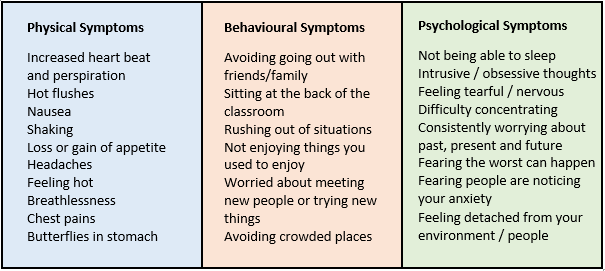Anxiety – five ways to cope while you study
Article Date | 17 May, 2023By Stephanie Pena Garcia, LSST’s Mental Health and Student Wellbeing Lead, Memo House

Image source: Freepik
Anxiety is the theme of this year’s Mental Health Awareness Week and although it is an emotion that is felt by everyone, during your course it may exacerbate under the pressures of studying. If your anxiety gets out of control, it may have a negative impact on your ability to study and overall experience in higher education.
A recent study by Student Minds has found that 1 in 3 students have poor mental wellbeing and 1 in 4 students do not know where to access support for their mental health.
The below guide on coping with anxiety aims to provide valuable advice to students. This guide explores the nature of anxiety, offers effective coping strategies, and highlights accessible support resources to aid in overcoming anxiety-related challenges:
1. Understanding Anxiety
Anxiety is an emotion of worry and fear which is very common within the UK population, six in ten adults have expressed feeling that anxiety has stopped them from doing the things they want to.
Anxiety is a natural response which can be useful in helping us avoid dangerous situations and keeps us motivated to solve everyday problems. When we feel under threat (this also includes perceived danger) our bodies react by releasing certain hormones, such as adrenaline and cortisol, that make us feel more aware and alert of what is happening – in this way, we can react faster. Our hearts begin to beat faster as it rapidly sends blood to where it’s needed most.
This is commonly known as the ‘fight or flight’ response – which we have no control over as it happens automatically. In some cases, anxiety can become a constant feeling, even when there is no apparent threat or stressor – this can be triggered by adverse childhood experiences, your current situation, or physical or mental health problems. Persistent and intense feelings of anxiety can develop into a diagnosed condition if it begins to affect your ability to live your life.
Anxiety can be experienced through our thoughts, feelings but also through physical sensations.
 Source: Adapted from www.nhs.uk/mental-health/feelings-symptoms-behaviours/feelings-and-symptoms/anxiety-fear-panic/
.
.
Source: Adapted from www.nhs.uk/mental-health/feelings-symptoms-behaviours/feelings-and-symptoms/anxiety-fear-panic/
.
.
2. Identifying how often you feel anxious
During your studies, there may be occasions where feelings of anxiety can increase such as exams, forming connections with peers, communicating with university staff and working to meet deadlines. You may also have difficulties in your personal life such as family conflicts, childcare problems, financial problems, and employment. Another common contributor to elevated levels of anxiety in students is fear of public speaking and social anxiety disorder which are associated with students fearing social interactions or performance situations.
A good way to self-assess your level of anxiety in your daily life is the Goldberg Anxiety Scale which can be commonly used by medical professionals as part of a wider assessment. Some of the questions in this scale include;
Have you been consistently worried recently?
Have you had difficulties relaxing?
Have you been sleeping poorly?
You can find more information or take the test to have an indication of how strongly anxiety impacts your daily life following this link.
Image source: Freepik
. .3. Exploring coping strategies and identifying what works for you
Adopting healthy coping strategies is a great skill to develop while at LSST. If you can effectively manage your anxiety through self-help strategies, you will be able to use this as a helpful tool to navigate the challenges that you may face such as preparing yourself for an oral presentation in front of your peers or during exam periods.
A coping strategy which can be useful to manage your anxiety levels is mindfulness. Studies show that students experience an increased sense of calm, and a decreased feeling of anxiety when practicing mindfulness for as little as five minutes a day. Mindfulness is the practice of purposely bringing your attention to the present moment and has been described as part of an ideal recipe for academic attainment along with self-compassion and resiliency. You can find out more about mindfulness and access free resources, visit The Free Mindfulness Project.
However, mental health is not a one-size-fits-all, and it is important to identify what works for you. A good way to do this is by keeping a record of how you are feeling and reflecting on this over time. Journaling is a good example of how to measure what works for you, studies have found that visual journalling can lead to a decrease in anxiety and stress. Similarly, research has also suggested that journaling is a positive intervention to help reduce exam anxiety while increasing examination scores for learners.
The following list of useful strategies may be a good starting point however we would love to know more so if you have any that work for you, please share by commenting on this post or emailing us at studentwellbeing@lsst.ac.

Image source: Freepik
4. Asking for help
“What is the bravest thing you’ve ever said?” Asked the boy.
“Help”, said the horse.
“Asking for help isn’t giving up”, said the horse. “It’s refusing to give up.”
Charlie Mackesy
This quote by Charlie Mackesy in his book The Boy, the Mole, the Fox and the Horse perfectly explains the importance of asking others for help. Although it can be daunting, it is an important step to take as you do not have to cope with your feelings alone. Help is available regardless of how long you’ve felt anxious or how severe your symptoms may be. There are many points of access for support when coping with anxiety, within LSST and externally. You can find key contact details at the end of this blog.
We take a whole organisation approach to mental health at LSST, so if you feel confident to do so, you can speak to any staff member, and they will signpost to the appropriate team or individual to support you.

Image source: Freepik
.
5. Look out for your peers
Being part of a community and developing a sense of belonging is a key aspect of our general wellbeing. It has been found that being in higher education can be a protective factor against anxiety and other mental health problems. Higher education creates the opportunity to connect with other students and staff from diverse backgrounds and cultures, allowing you to share experiences and open space to understand what mental health can look like to other people.
Every person experiences anxiety in different ways, it is beneficial to foster a compassionate and caring attitude to peers and colleagues. Studies suggest that being compassionate allows individuals to cope with challenging emotions with a greater degree of understanding. You can look out for your peers by spreading awareness of anxiety or other mental health difficulties that students experience and knowing where to signpost for further support if needed.

Image source: Freepik
If you would like to speak about anxiety or any other topics mentioned in this blog, please reach out to your local student support office by emailing one of the following:
Elephant & Castle Campus – ecstudentsupport@lsst.ac
Wembley Campus – wembleystudentsupport@lsst.ac
Luton Campus – lutonstudentsupport@lsst.ac
Aston Campus – astonsupport@lsst.ac
Or you can speak directly to our Student Wellbeing Team by contacting studentwellbeing@lsst.ac.
There are many charities and organisations in the UK that help individuals experiencing anxiety such as:
Mental Health Foundation – www.mentalhealth.org.uk
Anxiety UK – www.anxietyuk.org.uk
No Panic – www.nopanic.org.uk
Mind – https://www.mind.org.uk
Student Minds – www.studentminds.org.uk





